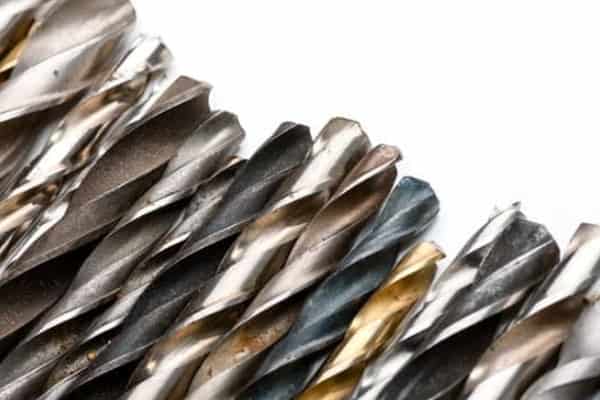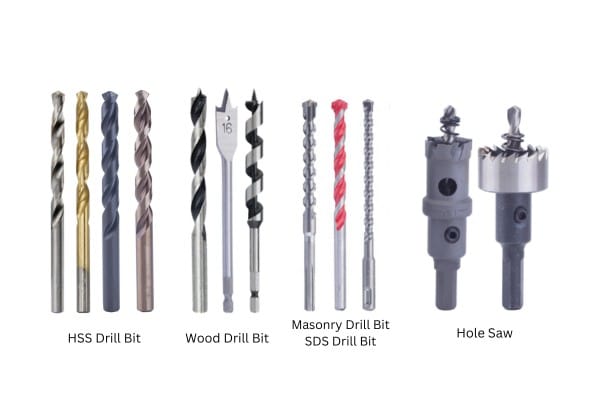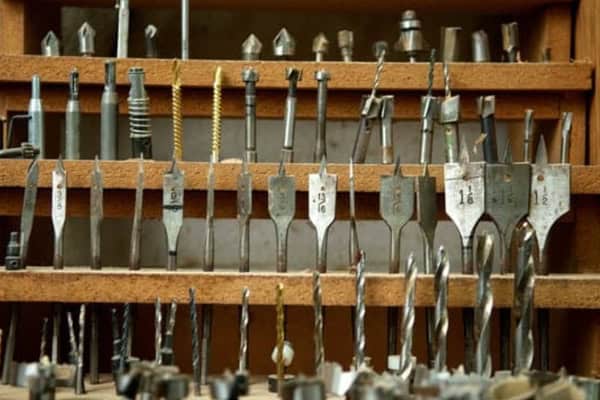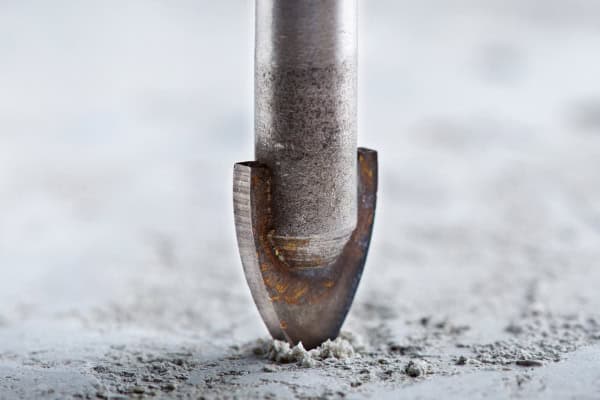
Have you ever wondered if drill bits are one-size-fits-all? Let’s dive into the world of drill bits and uncover the truth!
Drill bits come in various shapes and sizes, each designed for specific materials and tasks. Understanding the different types can help you choose the right bit for your project, ensuring efficiency and precision. From wood to metal, there’s a drill bit tailored for every need.
Choosing the right drill bit can make all the difference in your DIY projects. Let’s explore the different options available.
How Many Types of Drill Bits?
Ever thought about how many drill bit types are out there? It might surprise you!
There are numerous types of drill bits, each crafted for specific materials and tasks. Common categories include twist bits, spade bits, masonry bits, and hole saws. Each type serves a unique purpose, ensuring that your drilling tasks are completed efficiently and accurately.

Exploring the Variety of Drill Bits
Drill bits are more diverse than you might think. Here’s a breakdown:
| Tip | Best For | Özellikler |
|---|---|---|
| Büküm Uçları | Wood, metal, plastic | General-purpose, sharp tips |
| Spade Bits | Large holes in wood | Flat blades, wide cutting edges |
| Brad Point Bits | Precision holes in wood | Center point for accuracy, clean edges |
| Auger Bits | Deep holes in wood | Screw-like tip, efficient material removal |
| Duvar Bitleri | Concrete, brick, stone | Carbide tips, robust construction |
| SDS Plus/Max Bits | Heavy-duty masonry and concrete | Slotted drive, designed for hammer drills |
| Delik Testereleri | Large diameter holes in various materials | Circular saw design, different sizes |
Understanding these types helps in selecting the right bit for your specific project needs1. Each bit has its own strengths and ideal use cases, making it essential to know which one fits your task best.
Drill Bit Selection Guide: Types, Uses, and Maintenance
Struggling to choose the right drill bit? Let’s simplify it for you.
Selecting the right drill bit involves considering the material you’re drilling into, the size of the hole needed, and the drill bit’s durability. Proper maintenance, like cleaning and storage, also extends the life of your drill bits, ensuring they perform optimally every time you use them.

Choosing the Perfect Drill Bit
When selecting a drill bit, think about these factors:
- Material: Different bits are designed for wood, metal, masonry, or plastic.
- Size: Ensure the bit size matches the hole diameter you need.
- Durability: High-quality bits last longer and provide cleaner cuts.
- Maintenance: Keep your bits clean and store them properly to avoid damage.
Choosing the right drill bit is like picking the right tool from a toolbox—each one has a purpose, and using the wrong one can lead to frustration and poor results. I remember the first time I tried using a masonry bit2 on a wooden plank. The hole ended up rough and uneven, which was a clear sign that not all drill bits are created equal!
Maintaining Your Drill Bits
Proper maintenance is key to prolonging the life of your drill bits. Here are some tips:
- Clean After Use: Remove any debris or residue after each use. A quick wipe with a cloth can prevent buildup that dulls the bit.
- Store Properly: Keep bits in a dry, organized place to prevent rust and damage. Consider using a drill bit organizer to keep them sorted by type and size.
- Sharpen When Needed: Regularly check and sharpen bits to maintain their effectiveness. Dull bits can cause more harm than good, leading to inaccurate holes and increased wear on your drill.
I once had a set of drill bits that I neglected to clean after every project. Over time, they started to rust, and some even snapped during use. It was a costly lesson, but now I make sure to care for my bits properly.
Complete Guide to Drill Bits for Concrete, Metal, Tile & Wood
Confused about which drill bit to use for different materials? Let’s clear it up.
Different materials require specific drill bits to ensure clean and efficient drilling. For concrete, masonry bits with carbide tips are ideal. Metal drilling needs high-speed steel (HSS) bits, while wood can be drilled effectively with brad point, spade, or auger bits. Tile drilling benefits from carbide-tipped bits with a carbide or diamond tip for precision. Additionally, SDS drill bits, available in SDS Plus and SDS Max, are excellent for brick, stone, and concrete, with SDS Max being perfect for impact drilling.

Drilling into Various Materials
Each material has its own ideal drill bit:
- Concrete: Use masonry bits with carbide tips or SDS Max bits for heavy-duty drilling.
- Metal: High-speed steel (HSS) bits provide the strength needed.
- Tile: Carbide-tipped or diamond-tipped bits ensure precise cuts without cracking.
- Wood: Brad point, spade, or auger bits offer clean and accurate holes.
Tips for Successful Drilling
- Concrete: Use a hammer drill for better penetration, especially with SDS Max bits. Applying steady pressure helps the bit do its job without getting stuck.
- Metal: Apply steady pressure and keep the bit cool with lubricant. This prevents overheating and extends the life of your bit.
- Tile: Use masking tape to prevent slipping and reduce cracking. Starting with a small pilot hole can also make the process smoother.
- Wood: Drill at a consistent speed to avoid splintering. Using the right bit for the wood type ensures a clean finish.
Woodworking Drill Bits
When it comes to drilling wood, choosing the right bit is crucial for a smooth finish. Here are the main types:
- Brad Point Drill Bit: Perfect for precision holes in wood. The center point ensures accurate drilling, and the sharp edges provide clean cuts.
- Spade Drill Bit: Ideal for making large holes in wood quickly. Its flat blades and wide cutting edges allow for efficient material removal.
- Auger Drill Bit: Best for deep holes in wood. The screw-like tip helps pull the bit through the material, making drilling easier and more effective.
I recall a woodworking project where I needed to create large holes for dowels. Using a spade bit made the process much faster and left the wood looking pristine. On the other hand, for smaller, more precise holes, the brad point bit3 was indispensable.
Detailed Look at Wood Drill Bits
Brad Point Drill Bits
Brad point bits are designed for precision. Their sharp central point keeps the bit steady, preventing it from wandering. This makes them ideal for intricate woodworking projects where accuracy is paramount.
- Advantages:
- Accurate drilling
- Clean, splinter-free edges
- Best Uses:
- Furniture making
- Cabinetry
- Decorative woodwork
Spade Drill Bits
Spade bits are the go-to for larger holes in wood. Their wide, flat blades remove material quickly, making them perfect for tasks like installing door hardware or running wires through studs.
- Advantages:
- Fast material removal
- Suitable for large diameter holes
- Best Uses:
- Installing door knobs
- Running electrical wiring
- Creating large passages in wood
Auger Drill Bits
Auger bits excel at drilling deep holes. The screw-like design pulls the bit through the wood, reducing the effort needed from you. They’re perfect for tasks that require long, clean holes, such as plumbing installations or extensive carpentry work.
- Advantages:
- Efficient deep drilling
- Less effort required
- Best Uses:
- Plumbing installations
- Extensive carpentry projects
- Any task requiring deep holes in wood
SDS Matkap Uçları
SDS drill bits are a game-changer for heavy-duty masonry work. Available in SDS Plus and SDS Max, these bits are designed to handle the toughest materials with ease.
- SDS Plus:
- Best For: Medium-duty masonry tasks.
- Özellikler: Slotted drive system, compatible with most hammer drills.
- SDS Max:
- Best For: Heavy-duty impact drilling in concrete and stone.
- Özellikler: Larger shank, better grip, designed for high-impact hammer drills.
I remember tackling a concrete patio installation. Using SDS Max bits made the drilling process much smoother, allowing me to handle the tough concrete without constant bit changes or excessive strain on my tools.
What is the Difference Between SDS and HSS Drill Bits?
Ever heard of SDS and HSS drill bits? Let’s break it down.
SDS (Slotted Drive System) and HSS (High-Speed Steel) drill bits serve different purposes. SDS bits are designed for heavy-duty tasks like masonry drilling with hammer drills, offering better grip and durability. HSS bits are versatile and suitable for drilling into metal, wood, and plastic, providing sharpness and precision for general use. Additionally, SDS bits come in two main types: SDS Plus and SDS Max. SDS Max bits are more robust and better suited for impact drilling in tough materials like concrete.

Understanding SDS vs. HSS
Choosing between SDS and HSS depends on your drilling needs:
- SDS Drill Bits:
- Best For: Masonry, concrete, and heavy-duty drilling.
- Özellikler: Slotted drive, robust construction for hammer drills.
- Types:
- SDS Plus: Suitable for medium-duty tasks.
- SDS Max: Ideal for heavy-duty impact drilling.
- HSS Drill Bits:
- Best For: Metal, wood, and plastic.
- Özellikler: High-speed steel composition, sharp tips for precision.
When to Use Each Type
- Use SDS for: Drilling into brick, stone, or concrete where impact drilling is required. SDS Max is your go-to for the toughest jobs needing extra power.
- Use HSS for: Everyday tasks like building furniture, metalworking, or crafting projects where precision is key.
Detailed Comparison
| Özellik | SDS Plus | SDS Max | HSS |
|---|---|---|---|
| Best For | Medium-duty masonry tasks | Heavy-duty impact drilling | Metal, wood, plastic |
| Shank Design | Slotted drive | Larger, more robust slotted drive | Standard cylindrical shank |
| Uyumluluk | Most hammer drills | High-powered hammer drills | Standard drills and cordless drills |
| dayanıklılık | High for medium tasks | Extremely high for tough materials | Moderate, depends on use and care |
| Price Range | Moderate | Higher due to robust construction | Affordable, varies by quality |
Understanding these differences helps you make informed decisions, ensuring that you’re using the right bit for the job. This not only improves the quality of your work4 but also extends the lifespan of your tools.
Çözüm
Drill bits aren’t universal, but understanding their types can greatly enhance your projects. Choose wisely and drill with confidence!
-
Enable users to make informed decisions about the tools and bits they select. ↩
-
Provide detailed instructions and best practices for using this specialized drill bit, preventing common mistakes and improving drilling performance on hard materials. ↩
-
The unique features and benefits of this bit type, especially for making precise holes in woodworking. ↩
-
The proper selection and use of tool bits can enhance the overall craftsmanship and durability of their projects. ↩